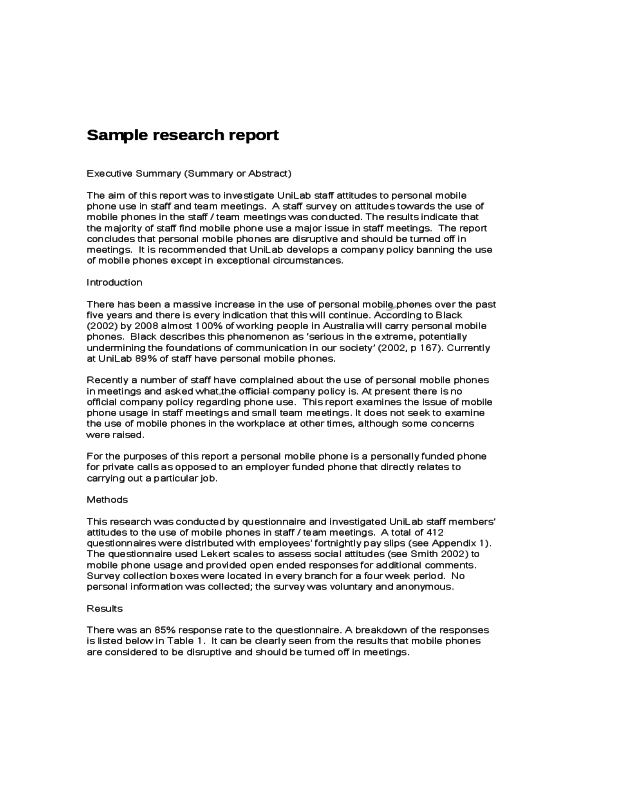Fillable Printable Sample Research Report - RMIT University
Fillable Printable Sample Research Report - RMIT University

Sample Research Report - RMIT University

Sample research report
Executive Summary (Summary or Abstract)
The aim of this report was to investigate UniLab staff attitudes to personal mobile
phone use in staff and team meetings. A staff survey on attitudes towards the use of
mobile phones in the staff / team meetings was conducted. The results indicate that
the majority of staff find mobile phone use a major issue in staff meetings. The report
concludes that personal mobile phones are disruptive and should be turned off in
meetings. It is recommended that UniLab develops a company policy banning the use
of mobile phones except in exceptional circumstances.
Introduction
There has been a massive increase in the use of personal mobile phones over the past
five years and there is every indication that this will continue. According to Black
(2002) by 2008 almost 100% of working people in Australia will carry personal mobile
phones. Black describes this phenomenon as ‘serious in the extreme, potentially
undermining the foundations of communication in our society’ (2002, p 167). Currently
at UniLab 89% of staff have personal mobile phones.
Recently a number of staff have complained about the use of personal mobile phones
in meetings and asked what the official company policy is. At present there is no
official company policy regarding phone use. This report examines the issue of mobile
phone usage in staff meetings and small team meetings. It does not seek to examine
the use of mobile phones in the workplace at other times, although some concerns
were raised.
For the purposes of this report a personal mobile phone is a personally funded phone
for private calls as opposed to an employer funded phone that directly relates to
carrying out a particular job.
Methods
This research was conducted by questionnaire and investigated UniLab staff members’
attitudes to the use of mobile phones in staff / team meetings. A total of 412
questionnaires were distributed with employees' fortnightly pay slips (see Appendix 1).
The questionnaire used Lekert scales to assess social attitudes (see Smith 2002) to
mobile phone usage and provided open ended responses for additional comments.
Survey collection boxes were located in every branch for a four week period. No
personal information was collected; the survey was voluntary and anonymous.
Results
There was an 85% response rate to the questionnaire. A breakdown of the responses
is listed below in Table 1. It can be clearly seen from the results that mobile phones
are considered to be disruptive and should be turned off in meetings.

Table 1
Personal mobile phone usage in
staff and team meetings is…
Strongly
agree %
Agree
%
Disagree
%
Strongly
disagree %
Not a problem 5 7 65 23
An issue 40 45 10 5
Disruptive 80 10 7 3
Phones should be permissible 6 16 56 22
Phones should be turned off 85 10 3 2
Allowed in some circumstances 10 52 24 14
The survey also allowed participants to identify any circumstances where mobile
phones should be allowed in meetings and also assessed staff attitudes towards
receiving personal phone calls in staff meetings in open ended questions. These
results showed that staff thought that in some circumstances, eg medical or
emergencies, receiving personal phone calls was acceptable, but generally receiving
personal phone calls was not necessary.
Discussion / Interpretation of Results
It can be seen from the results in Table 1 that personal mobile phone use is considered
to a problem; however it was acknowledged that in some situations it should be
permissible. 80% of recipients considered mobile phones to be highly disruptive and
there was strong support for phones being turned off in meetings (85%). Only 12%
thought that mobile phone usage in staff and team meetings was not a problem,
whereas 85% felt it was an issue. The results are consistent throughout the survey.
Many of the respondents (62%) felt that in exceptional circumstances mobile phones
should be allowed, eg medical, but there should be protocols regarding this.
These findings are consistent with other studies. According to Smith (2005) many
companies have identified mobile phones as disruptive and have banned the use of
mobile phones in meetings. Havir (2004) claims that 29% of staff meeting time is
wasted through unnecessary mobile phone interruptions. This affects time
The use of mobile phones in staff meetings is clearly disruptive and they should be
switched off. Most staff felt it is not necessary to receive personal phone calls in staff
meetings except under certain circumstances, but permission should first be sought
from the team leader, manager or chair.
Recommendations
It is recommended that UniLab develops an official policy regarding the use of mobile
phones in staff meetings. The policy should recommend:
•
mobile phones are banned in staff meetings
•
mobiles phone may be used in exceptional circumstances but only with the
permission of the appropriate manager or chair
Finally, the policy needs to apply to all staff in the company.



